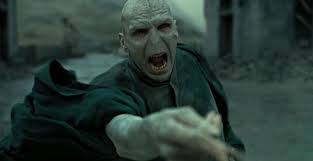Being a fan of Harry Potter I’ve heard it said by a number of fellow Christians that they feel the series is inappropriate due to its ties to witchcraft and/or wizardry. Now your faith is your faith and your opinion is your opinion, however I feel that anyone who feels that Harry Potter isn’t appropriate for Christian readers has completely missed the entire message of the story.
The Harry Potter series can be studied as an epic and that means that we’re presented with a larger than life hero who faces nearly insurmountable odds to defeat a larger than life villain. Love and the absence thereof is a continuous theme throughout the series. You have an arrogant villain who has never known love and you have a humble hero who was so loved by his parents that they gave their lives to protect him and his friends who risked everything for him time and time again.

Our villian, Voldemort is a wizard with both extraordinary power and extraordinary ambition. He is also extraordinarily arrogant which in the end becomes his undoing. Voldemort wasn’t born evil. No one is. He also wasn’t born Voldemort. Tom Marvolo Riddle was born to Merope Gaunt, a witch and direct descendant of Salazar Slytherin one of the four founders of Hogwarts and a muggle aristocrat by the name of Tom Riddle. His father left his mother while she was still pregnant with him and his mother died shortly after giving birth to him. He never knew the love of either of his parents. Being rejected by his father and losing his mother at such a young age is ultimately what turned Tom Marvolo Riddle into the evil Lord Voldemort. The old English epic poem Beowulf has a similar villain in Grendel. Grendel is a hideous monster because of his choice to separate himself from God’s love. We see a similar transformation as Tom Riddle changes from an attractive young man who looks like his father to an ugly, snakelike man as he destroys his soul by murdering innocent people so that he can become immortal.

Our hero, Harry Potter, is also an orphan thanks to Voldemort who murdered Harry’s parents when he was only a year old. Harry was born to James Potter and Lily Evans. Lily sacrificed her life to save Harry and by doing so sealed a powerful magic in his blood that caused Voldemort’s killing curse to rebound off of Harry and hit him. Lily Potter’s final act was one of love and it saved our hero’s life when he was only a baby. This will be the first of many times that our hero is saved by someone’s love for him.
Voldemort didn’t have friends during his time at Hogwarts. He had followers and hangers on, but didn’t have anyone he could really consider a true friend that loved him. Harry on the other hand, had Ron Weasley and Hermione Granger and have couldn’t asked for two truer friends than them. He even had the love of Ron’s sister Ginny. They all risked their lives and made sacrifices for him. Everything they did for Harry was done for love. Everything that Voldemort’s followers did for him was out of fear of what he would do if they didn’t do what he asked.

The final battle of Hogwarts could be considered a show of love conquering evil. Harry Potter fought an army and then freely gave his own life to save those he loved then destroyed Voldemort once and for all with the help of his friends and all those who loved him. Voldemort may have had an army but not one of his followers stayed loyal to him in the end. Just look at the Malfoys who turned tail and ran as soon as they could.
Just because a story involves magic doesn’t mean that it’s not appropriate for Christian readers, especially when the entire message of the story is that love is the most powerful magic, more powerful than any spell including or Unforgivable Curse
. The Bible teaches us time and again that love is more powerful than any evil in the world and that God is love. When you look at it that way, it’s hard to consider Harry Potter anything other than a good story with a positive message.

